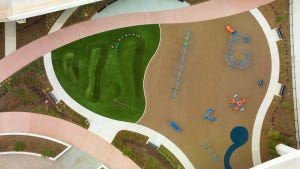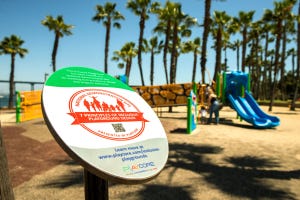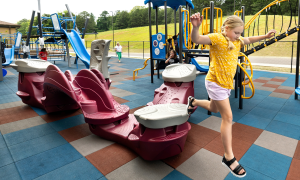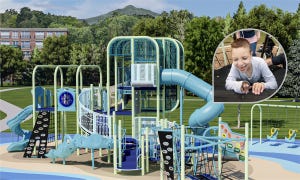Playful employees are more creative, focused on teamwork, and easily adapt to change. Those are a few of the findings from researchers and experts in the field of workplace psychology. Research also suggests creating opportunities for playful moments at work creates a friendlier work atmosphere, increases creativity, and enhances employees' commitment to their work.
Hiring managers who want to build a positive culture in their organization seek out playful people. And they incorporate play and recreation into team-building events and employee orientation to reduce stress and enhance personal and team performance.
Why Is Play Essential to the Workplace?
We know play and playgrounds are essential to helping children develop important skills like teamwork, decision-making, and empathy. But the concept of infusing play into the professional lives of adults is an emerging trend. To learn more about it, we sat down with PlayCore Senior Vice President, Tom Norquist.
Tom's 30+ year career has been focused on understanding the science of play and creating innovative play and recreation products for children and adults. He is a founding board member and current president of the International Play Equipment Manufacturer’s Association and sits on the board of Dr. Stuart Brown's National Institute For Play.
In other words, if you want to know how play makes lives better, Tom is the go-to person.
Three Questions About Play and Its Impact on Your Professional Life
Q: How does leading a playful life impact your professional life?
A: I would say a playful life and a playful word place is a very, very deep topic. And it's especially important in these pandemic times where people are having to socially distance, one another, like we're socially distanced right now. That's why I'm not wearing my mask. And not only that, but that we want to still be together as a tribe and to have that collaboration kind of effect, but how do you do that and change the way the office environment works today? And I think that one of the really, really fascinating explorations that we did at Playcore with our Auburn University affiliation—and where I am a professor of practice in the school of industrial design within the college of architecture—was creating outdoor environments, creating outdoor environments where people could get up and out of their office and take a break, but still talk about their work and hit the reset button and the refresh button by being outside in nature.
If you think about nature, play is a gift from nature to all of us. And so I think that's a really, really important thing for all of us to think about is okay, we go to the office to work. A lot of people now are staying home and at first when they stayed home, everybody was like, ‘Oh, I'm so much more productive. I can't believe it.’ And now that reality is sunk in after four or five, six months of everybody saying, ‘Oh, man. I want to get back to the office. I miss my people. I miss my work. I miss all of that collaboration and I miss my tribe.’ You know, there's that, that feeling that's deep from within.
And so how do we do that now? How do we change that? How do we break down the walls of the cubicle, and how do we take that outdoors and create environments for collaboration and brainstorming? Or maybe just having a break or saying, seeing somebody, I got a problem, let's just go out, let's go out to one of the tables and sit down and talk, and let that natural vibe of nature and the birds and the wind.
And it may even be some mist, or it could be clouds. It could be the sun. All of that sort of hits you. And it stimulates us as humans. It stimulates us and it helps us. It sharpens our brains a little bit. It makes us realize, ‘Hey, we have senses, what is that smell? Oh my goodness. That's a beautiful lavender smell.’ And it's coming from those bushes over here. Wow. Okay. That's what play does. And then the playful influence in the workspace. I think we're going to see a lot of offices where we start moving back outdoors.
Q: How are companies embracing a playful lifestyle and applying that to their corporate culture? And how are they using a playful environment to recruit employees?
A: Wow. That's a big, big question. We could write a book on that topic. In fact, it would probably be a bestseller.
So play influencing companies and their employee wellness programs, their productivity, and their creativity are all topics that have been written about in recent times. And when you research it, if you go out and, and go into a search engine platform and, and look for all the different things along those topics, you'll find many great campuses already built today that where you have like bike-share, ride-share between a large campus environment where they're getting people to be more active in terms of movement with their bodies. Colorful and playful art displays, outdoor ping pong tables, outdoor large chess sets, things like that. You'll see hundreds, examples of this already happening and people are getting it and companies are getting it and creating these outdoor environments. And when we were at Auburn, and we did all of our research, we found some very interesting trends with companies that are trying to attract younger employees that are just coming out of school and are, you know, top of the class and everything.
And these, these folks are really, really into their work environment and they don't want to be set in a cubicle and, you know, and just grind, grind, grind. What they're really looking for is an environment where they can openly express their feelings and their thoughts and ideas in a collaborative environment.
And then to divvy it up, get alignment on what they want to get accomplished as a company, and divvy up the work, and go get the work done and come back together and see what they've created. And then mold that and massage that. And how do you do that? Well, it's not done in a cubicle, like you saw in the, in the sixties and the seventies and the eighties and the nineties and two thousands. And we won't go any further. It's done in a collaborative work environment, almost like creating a coffee shop environment where people can come and go with their plugins and their wifi access and they can work, but they can spread all this stuff out together if they need to. Or not. So there's a lot of different ways that companies are starting to attack that or to leverage this concept of creative workspace.
Lots and lots of examples of that. Play plays a huge, important role in that, because a playful environment is a learning environment. Play and learning go hand in hand. A playful environment is an environment where people collaborate. It's an environment where people get along. They remember what they learned as a child in play and they have empathy, so they understand other people's ideas and they don't shut them down. They become more collaborative. Play does all this naturally in us. So having a playful influence in a work environment is extremely powerful. And top notch companies around the world, get that. They get it.
Q: How can play benefit individuals who may be stressed out?
A: If you're experiencing stress at any level in your life, a little bit of play brought into your life is going to help offset that stress. And we know that stress is, it's a chemical in your stomach, in your gut, called cortisol. And when you're stressed, you're producing that and I've actually experienced it. Recently, during the COVID times, and we were, we were doing some reorganization of our business and I was really stressed out. I woke up in the middle of the night with a gut pain, like I've never had before I knew exactly what it was. It was cortisol. It was stress, it was trying to destroy my body. Okay. So we have all experienced this. We've all experienced stress at different levels. Sometimes it could be just a mild little stress, and sometimes it can be as bad as what I felt, which was, you know, like, am I having a heart attack?
I mean, this is not good. Well, how do we offset that? How do we combat that? Well, it's a balance. And if all we're doing is things that are stressful and we're not balancing that out with some fun and some play and the scales are, you know, the scales are going to be heavily weighted in the wrong area. We know that through play, we create natural chemicals in our body. And when that happens, those positive chemicals that are good for our brains and good for our bodies stop cortisol from being produced.
So here's some examples: you're walking down the sidewalk. Okay. As a child, you might've said, ‘Hey, I don't want to step on a crack because it'll break my back,’ or something like that. Right. But you can play a little game yourself as you're walking and you can say, okay, I'm going to skip every, okay. There's little lines in the sidewalk. I'm going to skip every other one. And by doing that, you're just freeing your mind up. You're taking your mind off the stress. You're doing something that's fun and easy. People might look at you a little strange, but it's okay. Because all of a sudden it's like, ‘Hey, I'm smiling. I did, I did it. I made it. I made it all the way and I didn't touch one of those things.’ It's awesome. You can do that and everything. It's an attitude and it's a creative mindset of looking at things and going, you know, let's have a little bit of fun doing this.
How do we put play where the people actually are? So what's in it for you is an opportunity to go out there and literally vaccinate yourself to stress. Play is a vaccine. It's an absolute vaccine. It's a way of life, but you have to experience it. You have to feel it. You have to know it, then you have to take it to heart, and then you have to start doing it more and more and more. That'll change your persona. You'll become more playful. People will be attracted to you. Everybody wants to be around people that are fun. Everybody wants to be around people that smile. Yeah. Have fun. You it's just a wonderful thing. And you'll feel better yourself. You'll feel a lot better. You'll go, Hey, that day wasn't so bad. I had a lot of fun, you know, it wasn't so bad and Oh, I got all this work done too. And we had some fun doing it.
If you have questions about making play a part of your community, contact the GameTime play expert in your neighborhood.





